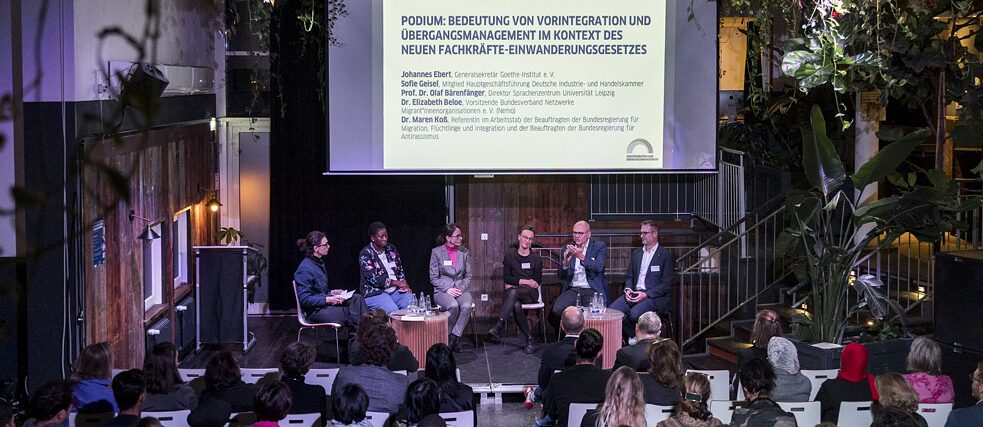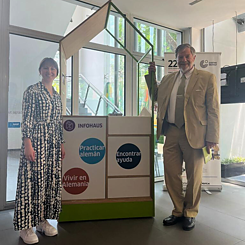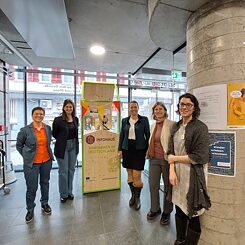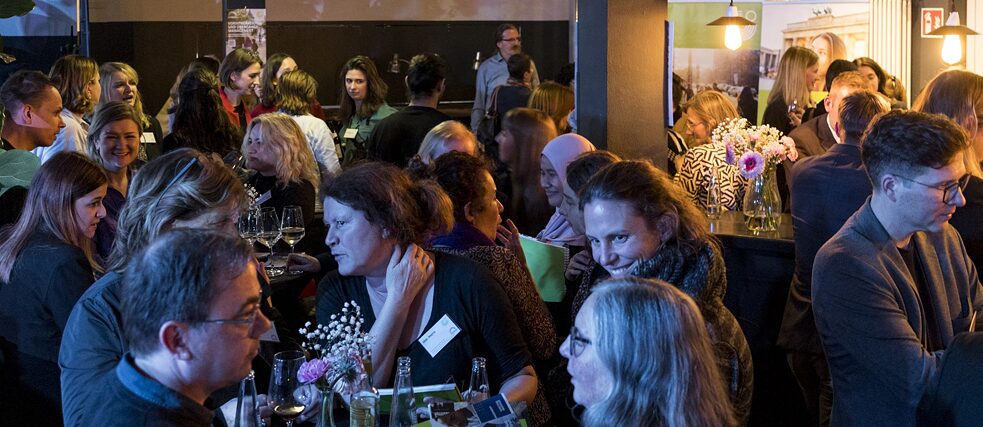Ensuring a successful migration process

Good preparation is important to ensure a successful experience for new migrants in Germany. The Goethe-Institut is improving the diverse and long-standing services provided in the origin countries as well as in Germany to make arrival in Germany easier for people from different countries, with the project “Pre-integration and transition management – ensuring a successful migration process”, which has been running since mid-2023.
By Jasmin Cool
Almost 70 people from over 30 countries are coming together in Munich for more than two weeks to discuss this issue: which factors are essential to ensure that new migrants and their families experience a successful arrival in Germany? Participants get to know each other in a face-to-face seminar, learn about recognising professional qualifications or antidiscrimination in workshops, discuss the challenges they face, and offer each other support. But what exactly is it that brings them together?
They all have one thing in common: the Goethe-Institut project “Pre-integration and transition management – ensuring a successful migration process”, which started in May. The project is co-funded by the European Union Asylum, Migration and Integration Fund (AMIF) and supports people who wish to migrate to Germany on a permanent basis for professional or personal reasons by preparing them for day-to-day living and the workplace. It covers the whole migration process, offering a range of services in their origin country before they depart and during the early days in Germany. Over the longer term, the goal is to encourage migrants to integrate with society in Germany. Programmes include information events and intercultural training, as well as conveying a realistic idea of what immigrants can expect in Germany. The plan is for these programmes – which allow for both face-to-face and remote uptake – to be delivered to around 95,000 people over the course of the project..
Expanding the pre-integration project to include new regions
To ensure a successful experience of the frequently difficult migration process, the Goethe-Institut’s pre-integration activities have in the past mainly been focused on the regions of South-East Europe, South-East Asia, South America and North Africa / Middle East. More locations have now been added, bringing the total number from 18 to 61. These include locations in the regions of Sub-Saharan Africa, North America and South Asia for the first time, as well as additional centres in South America and North Africa / Middle East. Regional coordinator for the North American region Margaretha Weckenbrock and German ambassador in Mexico Wolfgang Dold with an Infohaus at Goethe-Institut Mexico
| © Goethe-Institut Mexico
So what were the early days like in the new regions? “The first few weeks of the project were incredibly intensive, there were lots of meetings with the partner institutions. The first information events about living and working in Germany were held online. Participants were very interested and asked numerous questions about day-to-day life in Germany,” relates Margaretha Weckenbrock, coordinator for the North American region with centres in Mexico, El Salvador, Guatemala and Honduras. The region is represented in the new project for the first time. There have been numerous challenges – such as customising to local requirements and publicising the project in Mexico, El Salvador, Guatemala and Honduras, as well as reflecting the differences between the countries, although there are plenty of common features.
Regional coordinator for the North American region Margaretha Weckenbrock and German ambassador in Mexico Wolfgang Dold with an Infohaus at Goethe-Institut Mexico
| © Goethe-Institut Mexico
So what were the early days like in the new regions? “The first few weeks of the project were incredibly intensive, there were lots of meetings with the partner institutions. The first information events about living and working in Germany were held online. Participants were very interested and asked numerous questions about day-to-day life in Germany,” relates Margaretha Weckenbrock, coordinator for the North American region with centres in Mexico, El Salvador, Guatemala and Honduras. The region is represented in the new project for the first time. There have been numerous challenges – such as customising to local requirements and publicising the project in Mexico, El Salvador, Guatemala and Honduras, as well as reflecting the differences between the countries, although there are plenty of common features.With ten new locations and seventeen neighbouring countries eligible for support under the same umbrella, pre-integration work is under way in the Sub-Saharan Africa region, and the first big events and advice services are going live. “We’re very lucky and grateful to have regions from which we can learn,” reports regional coordinator Lorianne Meyer. “We were able to copy processes and ideas from countries like Brazil, Vietnam, Indonesia, Cairo, Tunisia and some of the countries in Eastern Europe. It’s a great help having a mentor system like this for new project regions.”
Building a bridge: Welcome Coaches provide support from the origin country to arrival in germany
Locations in Germany are also covered within the scope of the transition management sub-project. In July, six Welcome Coaches started work at the Goethe-Institut branches in Berlin, Düsseldorf, Frankfurt, Göttingen, Mannheim and Munich, with the aim of optimising transition management. Lisa Beck is one of them. As a Welcome Coach based in Mannheim, she’s responsible for guiding new migrants towards the integration system provided by the government. But what exactly does that mean?Migrants have access to the Welcome Coaches even before they leave their origin country, which ensures an easier transition between the pre-integration programmes abroad to the services available in Germany. In specific terms, as well as guiding them towards existing integration services offered by the government, working with cooperation partners in Germany (welcome / migration guidance centres), and directing them towards integration courses, the Welcome Coaches also put on their own events for new migrants. The wide-ranging programme on goethe.de/willkommen encompasses information events, workshops on living and working in Germany, and mini language courses.
In addition to the locations where they are based, the Welcome Coaches also look after various regions in Germany. Lisa Beck is responsible for Baden-Württemberg, Rhineland-Palatinate and Saarland. She’s in close dialogue with partners in the region, for instance with municipal institutions and cooperation partners at the Infohäuser. As an expert on her region, she’s able to share vital local knowledge: providing an overview of the integration pathway, guiding new migrants towards useful points of contact, and putting them in touch with people in the area.
“We’ve already started developing the network. I’ve been in contact with the cooperation partners in my region and visited some of the Infohäuser. The new migrants’ programme is already under way, and I’ve started to run events in collaboration with the other Welcome Coaches.”
Expanding the programme in Germany
The current project phase also involves expansion of existing services within the transition management sub-project: for the “Mein Weg nach Deutschland” web portal they are developing new German-language teaching materials for a professional context and course content covering key themes such as how to handle discrimination. “Mein Weg nach Deutschland” is currently available in 30 languages with accompanying audio in German as well as sign language videos, and it provides a comprehensive range of material for new migrants. It was set up ten years ago, and in 2022 it had more than 900,000 page views. Opening of the Infohaus at the library of Schwäbisch Hall
| © Goethe-Institut
Opening of the Infohaus at the library of Schwäbisch Hall
| © Goethe-Institut
To make the web portal even more accessible, they are increasing the number of Infohäuser within municipal institutions in rural areas throughout Germany in the current project phase, from 35 to 50 by 2025. As well as using the web portal, these facilities allow new migrants to research information on various topics, learn about the local integration system, and be signposted towards events and programmes provided by the Welcome Coaches. Furthermore, future plans are for the Infohäuser to be involved more intensively in integration work at local level and to become established as centres for event hosting and networking.
